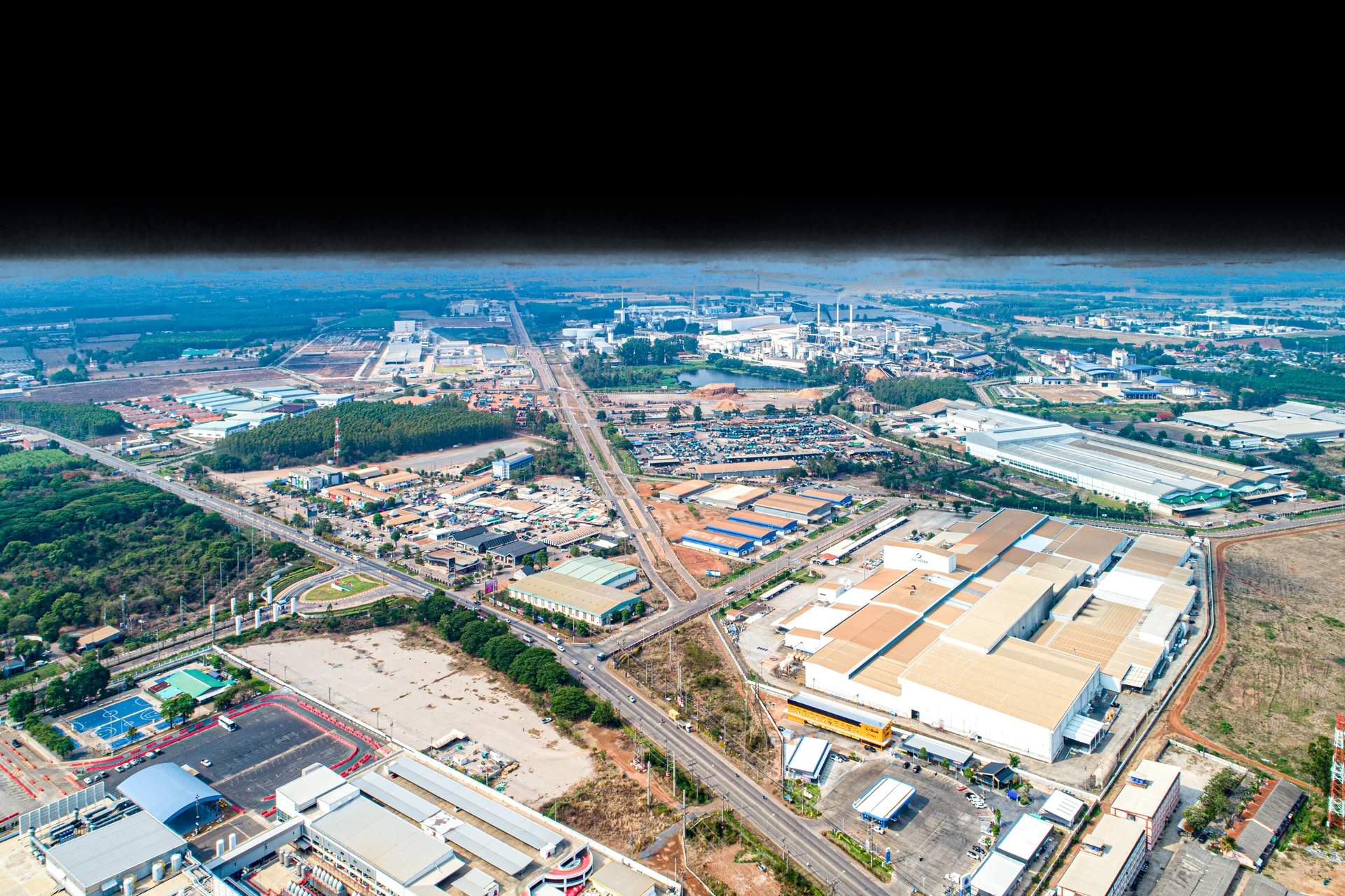What is an “Industrial Park”? How is it different from an Industrial Estate and an Industrial Zone?

An “Industrial Park” is one of the key mechanisms driving
Thailand’s economy.
It serves as a central hub for hosting large-scale factories and
businesses that require comprehensive infrastructure. Currently,
Thailand has over 72,000 licensed industrial factories, with more
than 4,000 of them located within industrial estates or parks across
the country. This highlights the role industrial parks play in
distributing manufacturing activities, creating jobs, and attracting
both domestic and foreign investment. Currently, Thailand has over
72,000 licensed industrial factories, with more than 4,000 of them
located within industrial estates or parks across the country. This
highlights the role industrial parks play in distributing
manufacturing activities, creating jobs, and attracting both
domestic and foreign investment.
What is an “Industrial Park”?
An industrial park is an area designated for industrial purposes,
developed by the private sector and not under the supervision of the
Industrial Estate Authority of Thailand (IEAT). It is equipped with
infrastructure ready for operations, ranging from utilities such as
electricity, water supply, and wastewater treatment systems to
natural disaster prevention systems.
The main purpose of an industrial park is to promote and enhance the
efficiency of industrial operations. Entrepreneurs benefit from the
convenience of comprehensive infrastructure and the flexibility to
customize the layout or size of the space according to their
specific needs.
In addition, many industrial parks also provide support in various
other areas, such as ready-built factory rental services,
consultation and assistance in arranging employee housing, and
document support services, to help entrepreneurs start their
businesses with ease.
Advantages of Investing in an Industrial Park
The key strength of an industrial park lies in its flexibility in
terms of approvals, land design, and space allocation, which suits
the nature of each investor’s business.
-
Strategic Location: Industrial parks are often located near major transportation hubs. For example, the 304 Industrial Park in Prachinburi is located near the Ladkrabang ICD warehouse, Laem Chabang Port, and Suvarnabhumi Airport.Ready-to-Use Infrastructure: Utilities are provided by the industrial park developer, enabling businesses to commence operations promptly.More Flexible Costs: Investors can select the land size and rental/ purchase options that suit their budget and business objectives.Comprehensive Services: Industrial park developers often have dedicated teams to support investors with permits, construction, engineering systems, and operations, enabling investors to focus entirely on their core business.Reception of expert advice on selecting the most suitable location for setting up a factory: This is based on the specific needs of the business, and consideration for environmental impact.Some industrial parks also support businesses in ESG (Environmental, Social, and Governance) aspects, for example, by providing renewable energy within the industrial park, or offering solar farm and solar roof installation services to help businesses move closer to achieving carbon neutrality goals.
What is the Difference among an Industrial Park, an Industrial Estate, and an Industrial Zone?
In Thailand, there are several designated types of areas for setting up factories and industrial activities, especially the three main types: industrial parks, industrial estates, and industrial zones. Although they share similar objectives, each type of area has the following key differences:-
Industrial Estate: refers to an area designated for industrial purposes by the Industrial Estate Authority of Thailand (IEAT), which may operate in collaboration with the private sector. The establishment and activities within the estate are subject to the regulations and conditions set by the IEAT.Industrial Park: refers to an area allocated, developed, and managed by private companies. It is not under the supervision of the IEAT and operates with more flexibility under the management of the project developer.Industrial Zone or Industrial Operation Zone: refers to a privately-owned industrial area that has been designated as an industrial zone under the Factory Act B.E. 2535 (1992).In all three models, the project developer is responsible for providing and installing basic infrastructure systems and facilities for entrepreneurs. Additionally, an Environmental Impact Assessment (EIA) report must be prepared before the commencement of the project.Examples of the differences between an Industrial Estate, an Industrial Park, and an Industrial Zone are as follows:
Qualifications/Criteria Industrial Estate Industrial Park Industrial Zone Supervision Industrial Estate Authority of Thailand (IEAT) or joint ventures with the private sector Private sector Primarily private sector, certified by government agencies Infrastructure and Services Developed by IEAT, with services ranging from land lease/purchase to approvals and certifications required for establishing a factory Developed by the project owner; supplementary services depend on the developer. For example, 304 Industrial Park offers comprehensive services and is managed by a team of experts Developed by the private sector, with infrastructure and responsibilities as defined by the Factory Act B.E. 2535 (1992) Factory Establishment Process Requires approval from IEAT Requires a factory operation license (Ror.Ngor. 4) from the Department of Industrial Works/Provincial Industry Office (depending on the horsepower of machinery) Does not require a factory operation license (Ror.Ngor. 4), but a certificate of factory operation in the Industrial Zone will be issued under Section 30 of the Factory Act B.E. 2535 (1992) Investment Incentives Eligible for benefits such as land ownership rights within the estate and additional incentives from the Board of Investment (BOI), if investment promotion is granted Eligible to apply for BOI promotion, and may receive benefits related to the EEC or Free Zone status if located in those designated areas Eligible for benefits as defined by the Factory Act B.E. 2535 (1992) Land Ownership Rights for Foreigners Foreigners may own land under the Industrial Estate Authority of Thailand Act B.E. 2522 (1979) Foreigners may own land if promoted by the BOI Foreigners may own land if promoted by the BOI Industrial Areas in Thailand
Thailand plays a significant role as a manufacturing hub in Southeast Asia. Currently, there are 26 industrial zones, 68 industrial estates, and numerous large-scale industrial parks across the country.Why is investing in an industrial park more cost-effective than developing land independently?
For entrepreneurs looking to expand or establish a new factory, developing land independently may seem like a flexible option with full control. However, in reality, the process comes with many hidden costs both in terms of time and budget. These include land acquisition, obtaining permits, setting up infrastructure, and complying with environmental regulations. Additionally, there are legal and regulatory risks that can change unexpectedly.Investing in an industrial park offers a convenient and efficient way for businesses to start operations quickly. The general advantages of investing in an industrial park include:-
Ready-to-use infrastructure and utilities, such as electricity, water supply, roads, wastewater treatment systems, and employee facilities.Professional support services, including construction, engineering, and safety systems.Cluster effect benefits, encouraging knowledge sharing, business networking, and greater market opportunities.Enhanced business credibility and the ability to apply for government support programs, such as investment promotion incentives from the BOI, which offer various benefits to investors.Enhanced business credibility and the ability to apply for government support programs, such as investment promotion incentives from the BOI, which offer various benefits to investors.304 Industrial Park is a leading example of comprehensive industrial area development. With over 30 years of experience, we are an industrial developer that is ready to support all types of industries.
-
High-quality infrastructure and complete utilities, along with facilities that cater to employees at all levels.Strategic location, close to Bangkok, Suvarnabhumi Airport, and Laem Chabang Port, enabling efficient transportation and logistics.One-Stop Service, offering consultation and support at no additional cost, facilitating every step from company registration and BOI investment promotion applications to factory establishment. It also includes after-sales services, such as logistics support, recruitment services, cleaning, and security services.304 Industrial Park also supports the use of clean energy under the concept of an Eco Industrial Town, promoting business growth and a sustainable future.
Related News & Media



